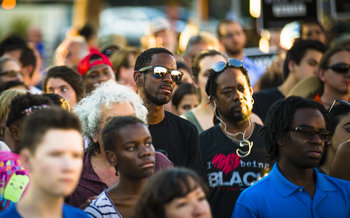Mediocrity
Mediocrity is an uninspiring state whereby an individual seeks only comfort and convenience within the safety of groups. The mediocre try to reflect what they believe to be the dominant opinions of the group as opposed to voicing any original thought. This allows a flawed idea to propagate across large populations without any resistance.Misinformation
Information that is inaccurate or incomplete may spread quickly across populations. This is particularly true where the information triggers an emotional response such as moral indignation.Groupthink
Groupthink is a system of reward and punishment for conforming to an ideology. Ideas are labeled as "us" or "them" by media pundits and other influencers within the group. Everyone who belongs to the group must then support ideas labeled as "us" or risk being labeled "them."Authoritarian Personality
An authoritarian personality is an individual who believes that the strategy, decisions, processes, policy and principles of the prevailing authority are absolutely and unquestionably correct. Without necessarily being asked, they act on this belief with a self-directed campaign to crush any dissent or criticism of authority. These are the self-appointed enforcers of groupthink.Spiral of Silence
A spiral of silence is a situation where an individual is afraid to speak their mind for fear of social isolation. This can result in a situation where everyone in a group appears to support ideas that they secretly view as terribly wrong.Abilene Paradox
The abilene paradox is the measurable tendency for individual members of a group to view group decisions as irrational. For example, a meeting of seven individuals makes a decision that all members support. After the meeting, they are confidentially surveyed and all view the decision as completely irrational. This occurs because people support ideas for social and political reasons as opposed to a belief the idea is correct.Panic
A sudden fear that spreads across a group driven by a strong emotion such as fear. The classic example is a stock market panic whereby price declines cause fear causing further price declines and more fear.Fear of Missing Out
A panic caused by jealousy and the fear that the crowd is getting ahead of you in some way. For example, a stock market bubble whereby price increases cause purchases motivated by a fear of missing out causing further price increases in a vicious cycle.Moral Panic
A moral panic is panic driven by a fear of an evil spreading in society. This may be started by moral entrepreneurs and media that seek to dramatize a perceived threat. A classic example is the Salem witch trials of February 1692 to May 1693 whereby over 200 people were accused of being witches in the area of Salem Massachusetts. Moral panics may only become clear in retrospect as people take them very seriously while they are in progress.Notes
Herd mentality is an analogy to the herding behavior of animals. Particularly, situations where individual animals continue to follow a herd even if they do something tragically unintelligent. For example, the native American hunting practice known as Buffalo jump whereby entire herds of buffalo were chased off a cliff. Each animal would follow the herd off the cliff despite the obvious flaws in this strategy.| Overview: Herd Mentality | ||
Type | ||
Definition | The capacity of groups to embrace and aggressively pursue irrational ideas. | |
Also Known As | ||
Related Concepts | ||



























